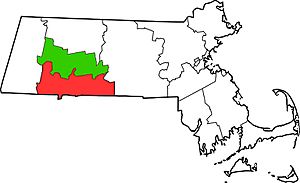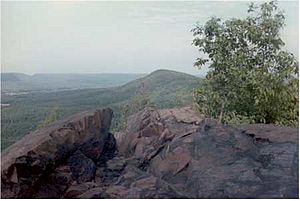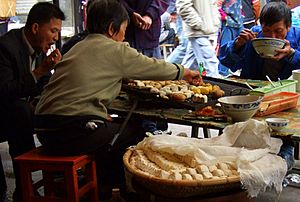Tofu Curtain facts for kids
The Tofu Curtain is a way to describe a difference between two areas and the people who live there. It's like an invisible line that separates places based on their culture, how much money people have, or their political ideas. The word "tofu" here stands for certain lifestyles and ways of thinking.
This term first came from the Pioneer Valley in Massachusetts, USA. It described differences between two counties there. But people also use "Tofu Curtain" for similar divides in other places, like Melbourne, Australia. It can also describe differences based on education or ethnic groups around the world.
The name "Tofu Curtain" comes from the "Iron Curtain" of the Cold War. That was a real barrier that separated communist countries from Western Europe. "Tofu" suggests that many vegetarians live on one side of the divide. It also links vegetarianism with left-wing (more liberal) political ideas.
Contents
Where the Tofu Curtain Is Found
In Western Massachusetts
In Western Massachusetts, the Tofu Curtain generally follows the Holyoke Range. This mountain range runs roughly east to west.
To the north of this line is Hampshire County. This area is often seen as wealthier. It is home to several colleges, including Amherst College, Hampshire College, Mount Holyoke College, Smith College, and the University of Massachusetts Amherst. These schools form the Five College Consortium.
To the south is Hampden County. This area includes cities like Holyoke and Springfield. Many people in these cities are working class. While it's the second-largest city area in Massachusetts, some parts have fewer jobs. Average household incomes can be lower here.
In contrast, the more rural areas north of the line have many small businesses. These businesses often make and sell natural products, like tofu. They sell to people who have more money.
However, the idea of a strict Tofu Curtain isn't always true. Hampden County also has many colleges and universities. Also, even in "wealthier" Hampshire County, there are differences. For example, in Amherst, many children receive free or reduced-price school lunches. This shows that not everyone there is wealthy.
People in Hampden County, including its large working-class and Puerto Rican communities, are also active in progressive politics. These activities are often linked to the college towns in the north. The idea of the Tofu Curtain has also encouraged people from both sides to work together. They want to create fairer systems for food, work, and the environment. Their goal is to unite the region and reduce economic differences.
Other Places in the United States
People sometimes use "tofu curtain" for similar situations outside of Western Massachusetts. For example, people in very progressive areas of New England, like Cambridge, Massachusetts, or the whole state of Vermont, are sometimes said to live "behind the Tofu Curtain."
The term can also be used in a negative way. Some people use it to criticize what they see as liberal ideas. For instance, you might find online discussions where people say California is "behind the tofu curtain." This often happens in forums that support more freedom for gun use.
The term can also describe differences in ideas, not just places. In 2003, writer Paul Gilroy used "tofu curtain" to describe small disagreements among student activists on a university campus. He meant that students were sometimes too focused on their own small groups.
The Inter-Cooperative Council at the University of Michigan also used the term. They called a food split between vegetarians and meat-eaters among their members "the Tofu Curtain." At one point, co-op houses on one side of a street in Ann Arbor had vegetarian kitchens. Houses on the other side had kitchens for meat-eaters. The Ann Arbor co-ops were using this term as early as 1984.
In Australia
In Australia's 2016 federal election, voters in Melbourne showed a similar divide. South of Bell Street in the northern suburb of Brunswick, most people voted for the Green Party. North of Bell Street, people voted for the Labor Party.
The neighborhoods that voted Labor are still politically left-leaning. However, they tend to be more working class. The neighborhoods of Brunswick and North Melbourne, which have been changing and becoming more expensive, voted Green. This split helped give Bell Street the nickname "Melbourne's Tofu Curtain."
In 2018, the fossil fuel industry in Australia used this nickname. They tried to use the term negatively. They hoped to divide Green Party and Labor activists. This was to stop them from working together against more coal mining and gas drilling.
Other nicknames for Bell Street and its social differences have appeared in Melbourne. These include "The Corduroy Line," "The Latte Line," "The Great Wall of Quinoa," and "The Hipster-Proof Fence." The last one reminds people of Australia's famous "rabbit-proof fence" from the early 1900s.
In Asia
Tofu first came from countries like China, Japan, and Korea in East Asia. So, "tofu curtain" has also described differences between Eastern and Western cultures.
A 2007 study by the United Nations's Food and Agriculture Organization showed something interesting. China consumed almost 100 times more soybeans per person than the United States in one year. Japan consumed over 200 times more per person than the U.S. Korea's soy use was between Japan's and China's.
In 2013, these numbers were still similar. Taiwan ate the most soyfoods per person, 15% more than Japan. In Asia, ethnicity and diet are important when using this term. But political ideas are less of a factor. This is because tofu is a common food in Asia. It is not linked to specific political groups or movements there.
In Other Media
In September 2016, people in Western Massachusetts started a website called TofuCurtain.com. It was for "Satire and Commentary in the Pioneer Valley." Some of its first stories were funny or critical. For example, "WikiLeaks Release Reveals Town of Hadley Extremely Boring." Another was "Hampshire College Replaces American Flag with 'For Sale' Sign." The website was no longer active by the end of 2018.
 | DeHart Hubbard |
 | Wilma Rudolph |
 | Jesse Owens |
 | Jackie Joyner-Kersee |
 | Major Taylor |




